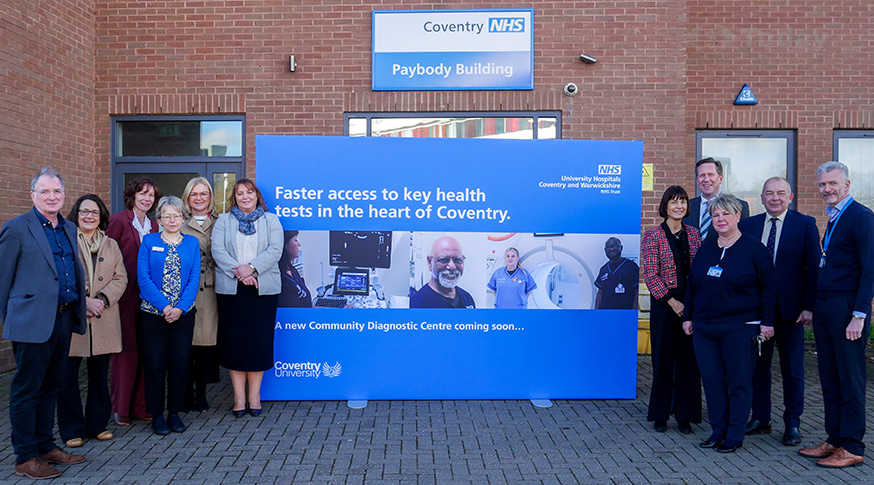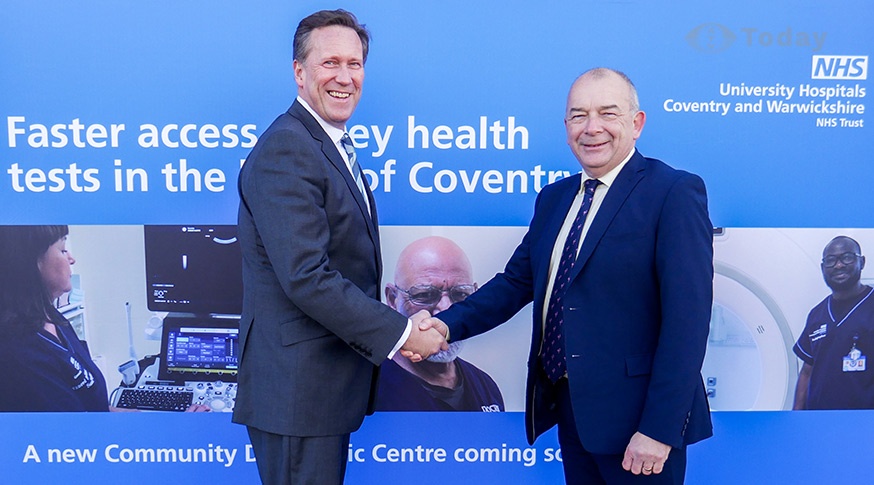Coventry University is set to help the NHS tackle health inequalities in the city centre…
Coventry University set to help the NHS thanks to UK-first collaboration. The uni is set to help the NHS tackle health inequalities in the city centre by becoming the UK’s first higher education institution co-located in an NHS Community Diagnostic Centre (CDC).
Professor John Latham CBE, Vice-Chancellor of Coventry University Group:
“We are delighted to be involved in a centre that will benefit the health of our local community by targeting problems that are impacting our local population and make access to healthcare in the city centre more accessible. This collaboration will also give our healthcare students access to hands on NHS learning experiences and placement opportunities in the city centre, enhance our participation in clinical research and patient trials, and support UHCW in growing and retaining their work force.
“I look forward to seeing our students, researchers and staff making a direct impact on our city and creating better futures for themselves and our community.”
The university plans to deliver teaching, learning, clinical placements, and research, enterprise and innovation at the new health centre alongside University Hospitals Coventry and Warwickshire (UHCW) NHS Trust. Once established, the centre will allow the two organisations to increase their capacity to educate the workforce of the future, giving students and researchers the ability to make a real-world impact on patients and practice.
The centre, which is expected to see about 90,000 patients annually and provide up to 75,000 additional patient tests a year by 2026, will target heart and lung problems and focus on expanding the city’s capacity for diagnosing cancers, due to high rates of premature mortality from those health issues in the Coventry area.

Coventry University is set to help the NHS tackle health inequalities in the city centre…
Development of the centre, which will be located in the Paybody Building, Stoney Stanton Road, Coventry, is ongoing, with patients in Coventry set to benefit from earlier diagnostic tests closer to home, rather than travelling to University Hospital Coventry, in Walsgrave, when the centre is planned to open in early 2025.
The co-location will also support the growth of Coventry University’s research and enterprise in health technology, translational medicine, diagnostics and digital health within the research centres for Health and Life Sciences, Healthcare and Communities, Intelligent Healthcare and Physical Activity, Sports and Exercise Science.
Professor Andy Hardy, Chief Executive at UHCW NHS Trust:
“The UK-first collaboration will see UHCW work closely with Coventry University to help tackle health inequalities in the city. As a Trust we are committed to being rooted in our communities and offering more services for the people of Coventry in a convenient city centre location, reducing the need to travel to University Hospital, Coventry. The centre will help to achieve earlier diagnoses for patients through easier, faster and more direct access to the full range of diagnostic tests needed to understand patients’ symptoms. The services offered will also be separate to urgent diagnostic scan facilities, which means shorter waiting times and a reduced risk of cancellation.
“Working in collaboration with Coventry University will provide an opportunity to further develop and grow the future diagnostics workforce.”
Andy Street, Mayor of the West Midlands and chair of the West Midlands Combined Authority noted on the venture that ‘There are long-standing issues around health inequality in our region which were starkly highlighted in our Heath of the Region report published in 2020. Those findings led to partners coming together to deliver on more than 50 commitments set out in the report to help tackle health inequality and improve people’s general wellbeing. This collaboration between UHCW NHS Trust and Coventry University is a wonderful example of what can be achieved by working together and I look forward to seeing how it helps improve the health of thousands of local people in the months and years ahead.’













